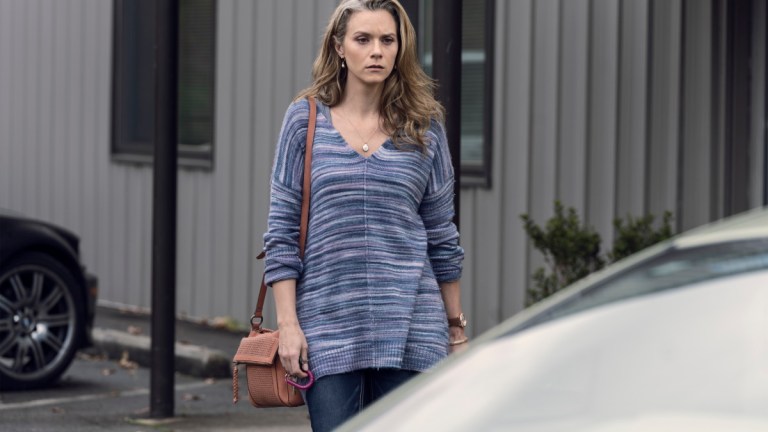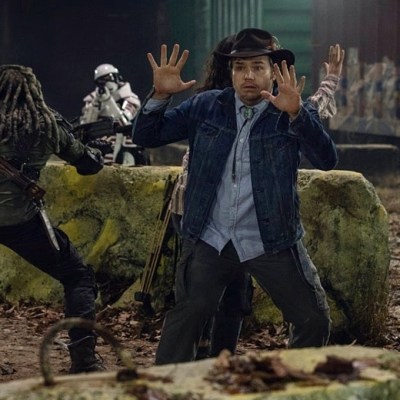The Walking Dead Season 10 Episode 22 Review: Here’s Negan
Negan transforms from a cantilevered joke in Fonzie cosplay to a three-dimensional character in one of the best episodes of The Walking Dead ever.

This The Walking Dead review contains spoilers.
The Walking Dead Season 10 Episode 22
Jeffrey Dean Morgan, for the most part, has been used poorly during his time on The Walking Dead. The actor has done his best with the material he’s been given, but for entirely too long Negan was a caricature of a person, a goofy swaggering cartoon trying to sound tough but forced to dumb down his language to avoid offending network sensibilities. It was silly, and while Negan might have been a fan-favorite villain, he didn’t exactly translate well to television in spite of my affection for both the character and the actor. He’s been fine, but he’s capable of so much more than he’s had the chance to show as one of the lead characters on the most popular show on cable television.
Now that is no longer the case. With “Here’s Negan,” Jeffrey Dean Morgan was given a major opportunity to show off his acting chops, and he absolutely shines. Morgan is so good here that he might have been able to change a lot of minds about a character that was a self-parody for most of his camera time.
A few weaker entries aside, The Walking Dead season 10 has been one of the strongest the show has ever had, and to say that about a show that has lost pretty much every major cast member and replaced the supporting cast a few pieces at a time is remarkable. It’s a testament to Angela Kang’s skill as a producer and showrunner that a show that kicked off and outlasted a zombie craze has recaptured this much of its glory this late in its run, without Rick, Michonne, or Carl. Even these bonus episodes have been mostly successful, with the less interesting ones still serving as interesting enough character pieces to fill in gaps or give hints at what might be happening in season 11.
No character has needed that revitalizing attention more than Negan. Hints of his origin dropped throughout the series in comments and asides. His wife died of cancer. His bat is named after his her. He used to be a gym teacher. Separately, they provide pieces enough to inform opinions about the character, but when all those details get weaved into his intense back-story, it goes from just character details to creating a fully-fledged human. Emerging out of caricature, stripping back the details to get to the heart of the whys behind his biker jacket, his slicked-back hair, his talkative swagger, his destructive rages, Jeffrey Dean Morgan and Hilarie Burton-Morgan take David Leslie Johnson-McGoldrick’s incredible script and breathe life and honesty into a heart-wrenchingly sad tale.
Twelve years previously, Negan (Morgan) finds himself on a life-or-death mission. Waylaid by bikers, Negan has to get away from them and get the vital chemotherapy drugs Lucille (Hilarie Burton-Morgan) needs to continue fighting off her cancer. He’s been gone too long, scavenging for food, seeking out the traveling medical team that he heard about—a team that might not even exist—after one last good night together with his wife distracts him for long enough that the drugs warm up in the ice-filled freezer and lose their effectiveness. He’s desperate; she’s survived well into the apocalypse and he knows how to give her the infusions and tend to her through her nausea and pain, he just needs the drugs and now that he’s gotten them, he can’t let a bunch of bikers stand in his way, even if that means betraying good people to bad guys just to save his own skin.
The episode moves easily back and forth through time, with little touches of Negan-esque humor; the chyron denoting Negan finding the doctor as ‘two or three days ago’ is a nice touch. Twelve years earlier, two or three days earlier than that, six weeks back from that, and finally seven months back from that, the episode moves easily and logically through scenes as Negan tells his story to the doctors, to the bikers, to himself, and to us. The relationship between Negan and Lucille plays out between them.
Negan, no job or prospects to speak of, having an affair with his wife’s best friend when he’s not buying $600 jackets and playing video games all day. Negan, reading a book to his wife while she receives her chemo infusion. Negan, trying to rob an armed caravan with an unloaded gun, only to get a kiss from Lucille (the bat) for his troubles. Negan, tied to a chair, begging for the chance to save his wife’s life. Negan, in tears, promising Lucille that he’ll never give up while she tries her best to tell him that he’s done enough, that he’s become the person she always knew he could be, even when he wasn’t, sharing a dried-out joint and a meal of dog food. Negan, rushing home to find out that he’s too late.
Anchored by a brief framing device where Negan leaves Alexandria to avoid Maggie’s wrath, then returns to Alexandria in spite of Maggie’s wrath, “Here’s Negan” is a beautifully touching, beautifully tragic story that is familiar to anyone who has ever watched helplessly while a loved one died before your eyes. Negan won’t quit, because Negan can’t quit. Any little hope, no matter how small, is enough to keep fighting, to dig heels in and try even when there’s no reason to keep trying any more. Even when the person who is dying is giving you permission to move on with your life without them.
The episode is basically a two-hander with Jeffrey Dean Morgan and Hilarie Burton-Morgan playing off each other, and the sequences that the two share carry a palpable weight and chemistry to them. When Negan has tears in his eyes because of the pain he put Lucille through, it feels real because we’ve seen her crawl into his arms and give him a hug and tell him it’s okay to let her go. Both performers play off each other beautifully, and it’s pretty clear that the emotional connection shared by their real-life relationship and their shared bond over health difficulties bleeds over into the fictional words of Johnson-McGoldrick without distracting from them or overwhelming them.
Laura Belsey does a good job of keeping things restrained as appropriate for the characters, and the few Negan-ish touches (the way he grins at the bat for example, the first time he puts on the leather jacket, when he’s standing over a biker he’s tied to a chair) are very deftly handled. It’s the early stages of Negan finding that character he’d become later, and there’s still a human Negan in there somewhere grieving for his lost wife and blaming her death on the people in front of him. The death of Lucille at her own hands, taking the choice of out Negan’s, fits with that character. She’s forgiven him, and she won’t let him kill himself trying to stave off the inevitable.
Negan’s use of the fireplace in his chill-out cabin as a way to say his goodbye to his other Lucille is fitting, a good way of physically showing the psychological action of Negan coming to terms with the character he was and the person he really is. Maybe the people of Alexandria will still see him as Negan the bat-wielding Savior who put them through hell; Maggie certainly does. There’s nothing Negan can do to change that, just like there was nothing he could to do keep Lucille alive through both cancer treatment and a zombie apocalypse. He tried his best, on both counts, and while he might not win the fight, he made a promise to keep fighting.
You don’t keep fighting by hiding from people who don’t like you. You can’t redeem a character by hiding him in the background. Negan will face his demons head on, and while he might lose, he’ll go down swinging.


